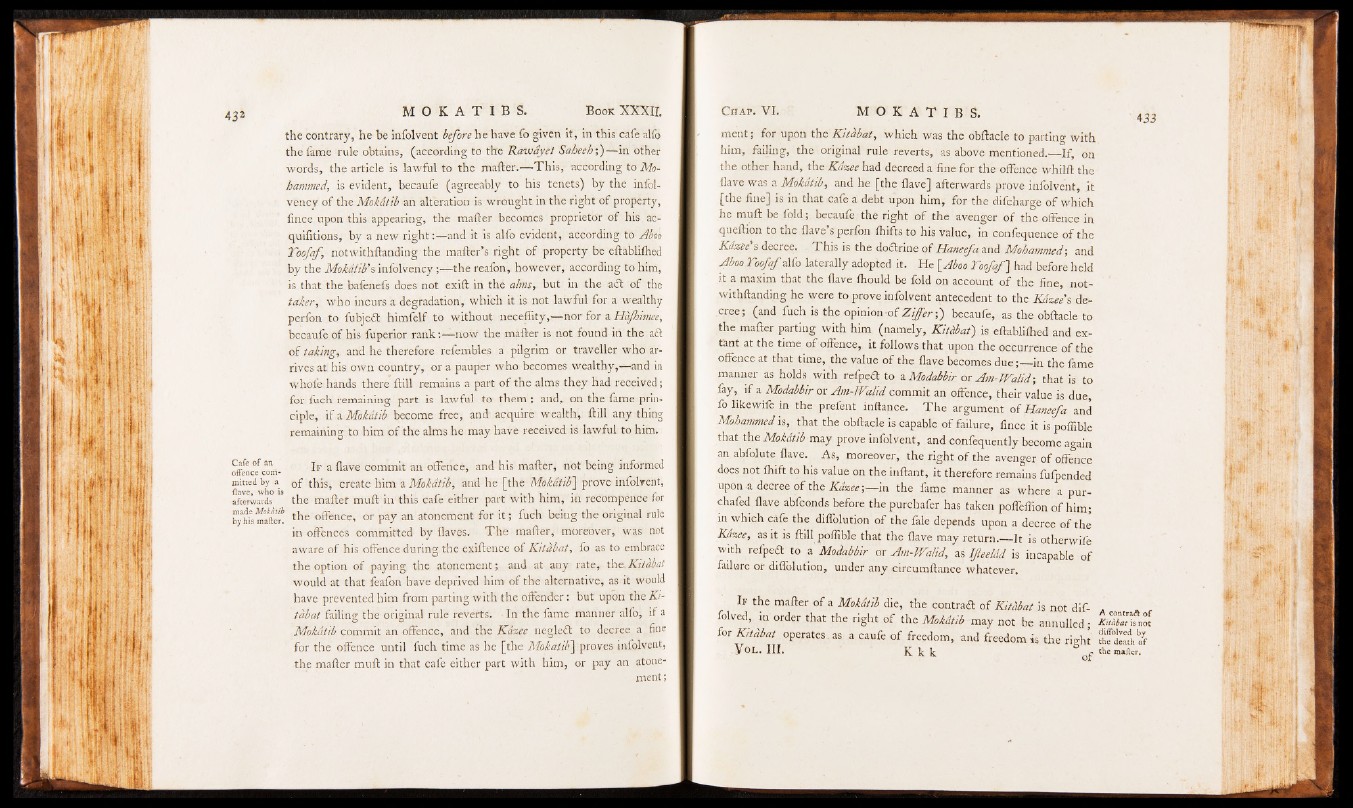
the contrary, he be infolvent before he have fo given it, in this cafe alfo
the lame rule obtains, (according to the Rawayet Saheeh\)— 'm. other
words, the article is lawful to the matter.— This, according to Mohammed,
is evident, becaufe (agreeably to his tenets) by the infol-
vency of the Mokdtib an alteration is wrought in the right of property,
lince upon this appearing, the matter becomes proprietor of his ac-
quifitions, by a new right:—and it is alfo evident, according to Aboo
Toofaf, notwithftanding the matter’s right of property be eftablilhed
by the Mokdiib's infolvency;— the reafon, however, according to him,
is that the bafenefs does not exift in the alms, but in the adt of the
taker, who incurs a degradation, which it is not lawful for a wealthy
perfon to fubjedt himfelf to without neceffity,— nor for a Hajhimee,
becaufe of his fuperior r a n k n o w the matter is not found in the aft
of taking, and he therefore refembles a pilgrim or traveller who arrives
at. his oWn country,, or a pauper who becomes wealthy,— and in
whofe hands there ftill remains a part of the alms they had received;
for fuch remaining part is lawful to them; and, on the fame principle,
if a Mokdtib become free, and acquire wealth, ftill any thing
remaining to him of the alms he may have received is lawful to him.
Cafe of an i F a flave commit an offence, and his matter, not being informed
mitted by a c f this, create him a Mokdtib, and he [the Mokdtib] prove infolvent,
afterwards the matter mutt in this cafe either part with him, in recompence for
the offence, or pay an atonement for i t ; fuch being the original rule
in offences committed by (laves. T h e matter, moreover, was not
aware of his offence during the exiftence of Kitabat, fo as to embrace
the option of paying, the atonement; and at any rate, the..Kitabat
would at that feafon have deprived him of the alternative, as it would
have prevented him from parting with the offender: but upon the Kitabat
failing the original rule reverts. In the fame manner alfo, if a
Mokdtib commit an offence, and the Kdzee negledt to decree a fine
for the offence until fuch time as he [the Mokatib~\ proves infolvent,
the matter mutt in that cafe either part with him, or pay an atonement;
ment; for upon the Kitabat, which was the obftacle to partin°- with
him, failing, the original rule reverts, as above mentioned.— If, on
the other hand, the Kdzee had decreed a fine for the offence whilft the
flave was a Mokdtib, and he [the flave] afterwards prove infolvent, it
[the fine] is in that cafe a debt upon him, for the difeharge of which
he mutt be fold; becaufe the right of the avenger of the offence in
queftion to the flave’s perfon fhifts to his value, in confequence of the
Kdzee’ s decree. This is the dodtrine of Haneefa and Mohammed-, and
Aboo Toofaf Mo laterally adopted it. He [Aboo Toofaf] had before held
it a maxim that the flave fhould be fold on account of the fine, notwithftanding
he were to prove infolvent antecedent to the Kdzee's decree;
(and fuch is the opinion -of Ziffer-,) becaufe, as the obftacle to
the matter parting with him (namely, Kitdbat) is eftablifhed and extant
at the time of offence, it follows that upon the occurrence o f the
offence at that time, the value of the flave becomes due;— in the fame
manner as holds with refpeit to a Modabbir or Am-Walid-, that is to
fay, if a Modabbir or Am-Walid commit an offence, their value is due
fo likewife in the prefent inftance. T h e argument of Haneefa and
Mohammed is, that the obftacle is capable of failure, fince it is poffible
that the Mokdtib rosy prove infolvent, and confequently become again
an abfolute flave. As, moreover, the right of the avenger of offence
does not fhift to his value on the inftant, it therefore remains fufpended
upon -a decree of the Kdzee;— in the fame manner as where a pur-
chafed flave abfeonds before thepurchafer has taken poffeffion of him;
in which cafe the diflolution o f the fale depends upon a decree of the
Kdzee, as it is ftill poffible that the flave may return.-— It is otherwife
with refpedt to a Modabbir or Am-Walid, as Ifeeldd is incapable of
failure or diflolution, under any circumftance whatever.
If the matter of a Mokdtib die, the contrail of Kitabat is not dif-
folved, in order that the right of the Mokdtib may not be annulled ;
for Kitdbat operates, as a caufe of freedom, and freedom is the ri°ht
Voi-.III. K k k of
A contra# o f
Kitabat is not
diffolved by
the death o f
the xpaJlcr.